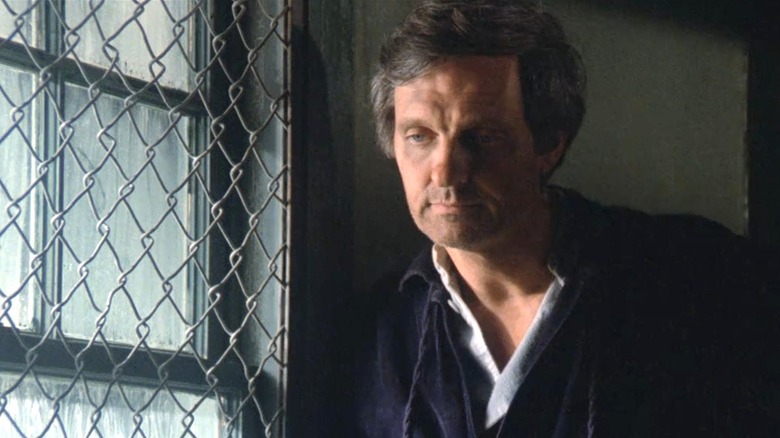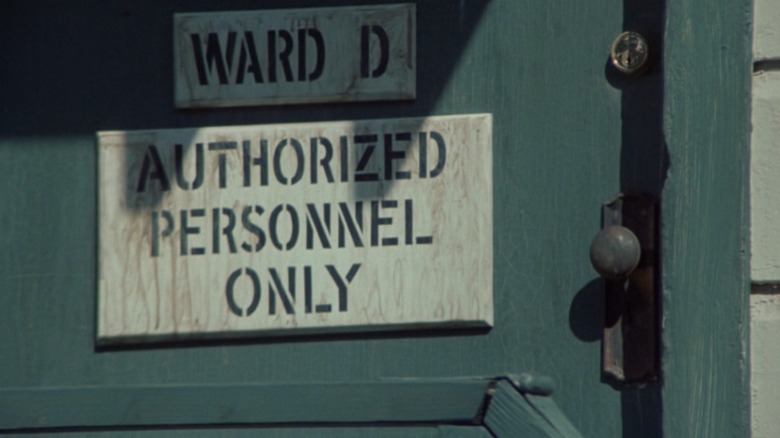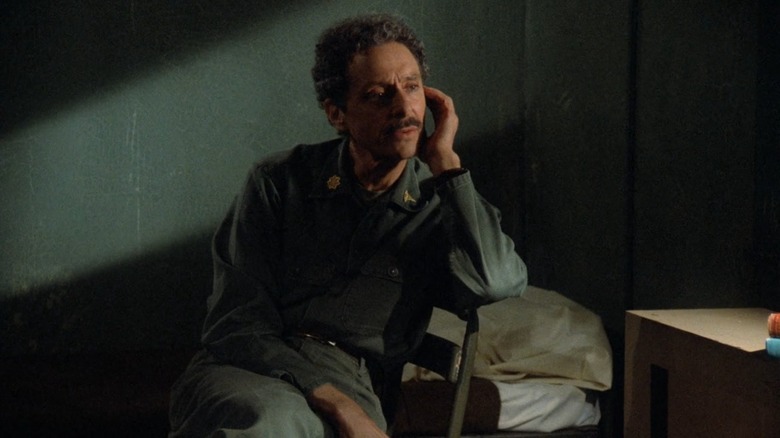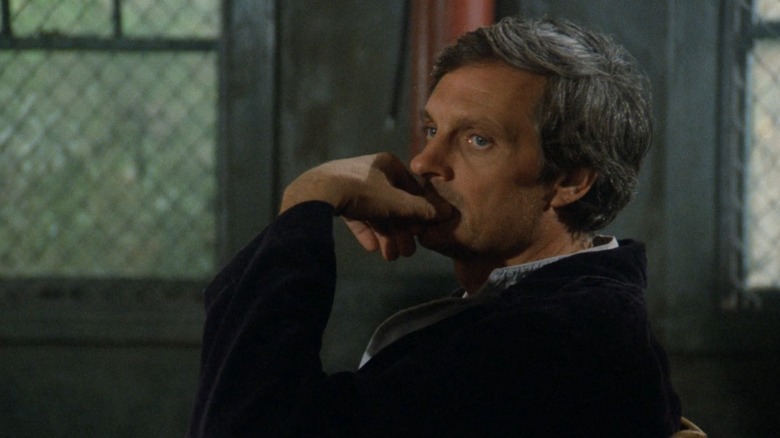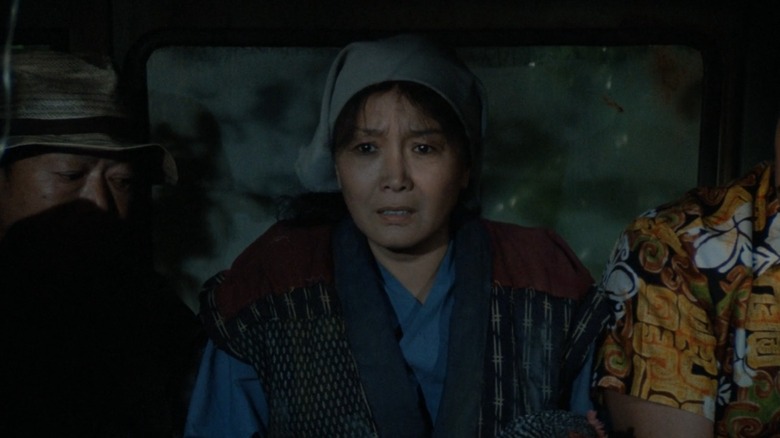The Darkest Moment In M*A*S*H Was Based On A True Story
Content warning: This article discusses themes and subject matter that some readers may find triggering, including the death of children during wartime.
"M*A*S*H" was a sitcom, but it had its serious moments. In fact, the long-running Korean War series is remembered as much for its moments of heartbreaking honesty as for its jokes and pranks. There was the time when Hawkeye's dear friend is killed while writing a book called "You Never Hear the Bullet," and uses some of his final moments to tell Hawk he did hear the bullet that shot him after all. Then there was the death of Lt. Colonel Blake, whose cheerful goodbye episode famously ended with Radar's declaration that the newly retired man's plane was shot down on its way home, leaving no survivors. The latter twist became so infamous that it prompted thousands of distressed fan responses — and the scene rarely played in reruns.
These are only a fraction of the most sobering moments in "M*A*S*H," but the show's bleakest plotline came way late in the series' 11-season run: in the feature-length series finale, "Goodbye, Farewell, and Amen." Like many of the show's most memorable episodes, it was based on a true story.
A day at the beach goes wrong
There's no easy way to talk about the chicken story. If you've seen all of "M*A*S*H" and don't remember it, your brain is likely doing the same thing Hawkeye's did by protecting you from an unbearably traumatic memory. "Goodbye, Farewell, and Amen" is most often referenced as a joyous endpoint — a long-awaited ceasefire that leads to a multi-part goodbye, ending with the word "Goodbye" actually written in rocks along the hillside. The episode is a celebration of peace, to be sure, but writer Alan Alda (who also directed and stars as head surgeon Hawkeye) works hard to make sure viewers know that war's impact — especially on civilians — is lasting and unimaginable.
He does this with a surprising plot point that sees Hawkeye away at a mental hospital. The doctor has clearly suffered from PTSD and associated problems — including a bad habit of drinking away his worries — throughout the series, but as the series draws to a close, he can no longer ignore them. After a nervous breakdown, Hawkeye begins having regular sessions with psychologist Sidney Freedman (Allan Arbus), who has helped him work through at least one repressed memory before. This time, Hawkeye keeps fixating on a trip the 4077th MASH unit took to the beach. He initially imagines it as an idyllic scene, but it gets darker when he recalls the way the bus ride back was interrupted by the threat of enemy patrols.
The truth about the chicken story
The scene restructures itself each time Hawkeye returns to it in his mind's eye, becoming clearer — and more ominous — by the moment. Eventually, the surgeon recalls that the group was traveling with South Korean refugees, and that one woman (June Kyoto Lu) was holding a chicken. With the enemy nearly upon them, Hawkeye commanded that the woman shush the bird so its sounds wouldn't carry and give away the group's position. After a verbal back-and-forth that takes several sessions, the truth comes out: it wasn't a chicken, but a crying baby, and the woman smothered it to keep everyone else safe.
It's the darkest moment in "M*A*S*H," one that's impossible to come away from without a sense of shock and horror. The idea of a parent doing the unthinkable to keep dozens of people alive is hard to even process, and it's no wonder Hawkeye put the memory away in a box where even he couldn't access it. Unfortunately, though, the story is true. During an anniversary interview with The Hollywood Reporter in 2018, executive producer, writer, and director Burt Metcalfe spoke about the awful anecdote that inspired the plotline. "When I went to Korea, a man told me that during the war, a North Korean patrol was crossing across a bridge," he recalled. "Hiding underneath were 40 or 50 South Koreans trying to escape south to avoid being imprisoned or killed by the invading soldiers."
Hawkeye's repressed memory is based on a horrifying real event
It's worth noting that in the real story, the fun day at the beach didn't exist, and white American doctors seemingly weren't present either. The heartbreaking decision one unnamed parent made was the same, though. "A mother's baby in the group started to cry, and she smothered it to avoid the group's detection," Metcalfe said. "It became the focal point of the whole opening of the show with Hawkeye in the psychiatric ward under the care of Dr. Sidney." Metcalfe also spoke about hearing the story in Suzy Gershman's (née Kalter) "The Complete Book of M*A*S*H," noting that the story "astounded" him when he heard it while visiting the last remaining Mobile Army Surgical Hospital in Busan, South Korea.
Metcalfe was even more upset by the reaction he got when he told others from the M*A*S*H unit who asked what he'd learned from his trip about the story. Instead of feeling the deep shock and heartbreak he'd felt, he says, "They all reacted with a shrug, as if 'What else is new?' and told me similar stories. What was horrifying and memorable to me was commonplace to them." This sentiment is especially haunting; it shows how desensitized Americans working during the Korean War could become to the deep pain and trauma of the locals they were meant to be helping.
M*A*S*H never became numb to the violence
Even TV doctors like Hawkeye suffered from the numbing effects of constant exposure to violence, but for the most part, the show's protagonist was an emotional raw nerve living with a constant, maddening awareness of the senseless loss around him. In the show's series finale, instead of wrapping up Hawkeye's story with a tidy bow, Alda and the writers chose to do something realistic: make that loss feel insurmountable. Hawkeye's vow to do no harm was broken by his inadvertent involvement in the death of a baby he'd hoped to keep safe. After facing the truth about his worst memory, the doctor does leave the hospital and return to duty, but he's a changed person — as were the viewers at home.
While "M*A*S*H" worked hard to tell the stories of civilians during wartime with dignity and specificity, it's still a show made mostly by, for, and about white people that aired in the 1970s. If you want to learn more about the Korean War from the perspective of Korean storytellers who survived it, check out books like "Year of Famine in the City" by Park Wan-suh, "The Sound of My Waves" by Ko Un, "To Kill A Tiger" by Jid Lee, and more.
